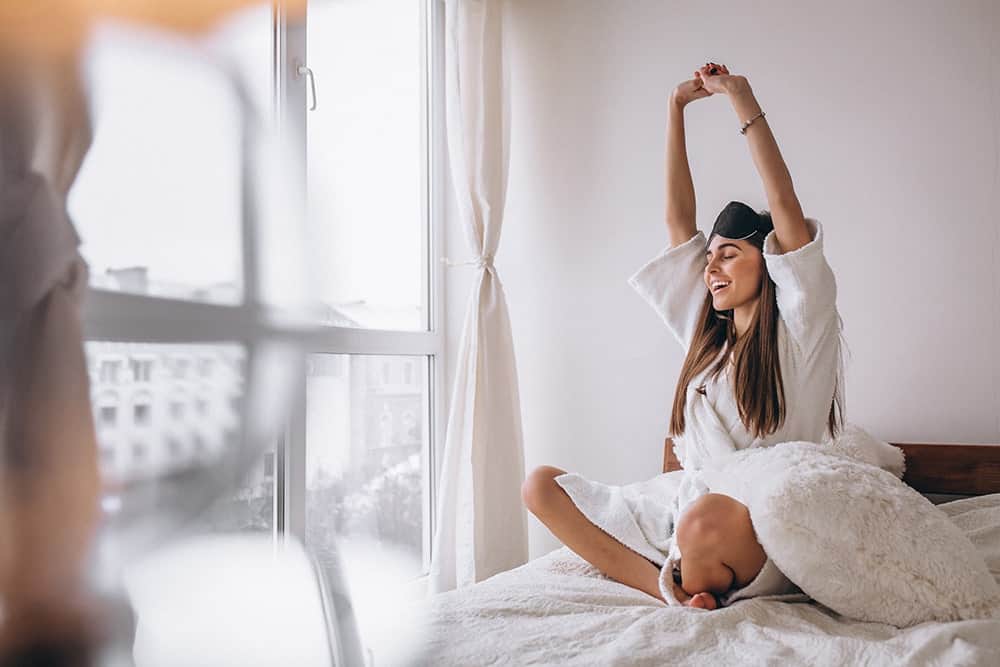According to some experts, sleeping towards the East is the best direction to sleep in as it helps to achieve meditation and good focus. But wait!
Sleeping in a specific direction – Is that even a thing?
For ancients, this was a very important aspect of life as they were eager to understand the connection between different energies and the human body.
How many of you have observed that when you wake up some mornings, you feel ugly and depressed for no reason?
Even though you have slept in good spirits, all your waking up leads to is another day of low self-esteem, sinking energy, and guilt of not doing enough because something feels off.
Turns out you are not alone in the struggle!
Feeling drained and confused even after getting adequate sleep is one of the most commonly faced problems around the world. As strange as it may sound, most of our sleep quality is not just dependent on the number of hours we get but the direction we sleep in.
Ancient practitioners have always put stress on sleeping in the right direction at night but much to the millennial’s ignorance, the useful information about Vastu Shastra and Feng Shui have been swept under the rug – until recently caught by the eye of Science.
Read on to learn more about how you can get the best sleep by simply switching to the right direction!
The Basics Of Vastu Shastra And Feng Shui
 The ancient principles of Vastu Shastra and Feng Shui, are interconnected but both of them belong to different origins.
The ancient principles of Vastu Shastra and Feng Shui, are interconnected but both of them belong to different origins.
Vastu Shastra is rooted in Hinduism and Buddhism. It literally means ‘The Science of Architecture’ and wholly dictates that every aspect of life should be guided by directions. Proponents of Vastu Shatra believe that every direction’s magnetic field invites good and bad energy which can either disrupt or enhance the quality of life.
The fundamentals of Vastu Shastra spatial geometry are applied in architecture, in the arrangement of furniture, and even your sleeping direction. The counterpart of Vastu Shastra, Feng Shui, a native way of life and part of Tao philosophy that originates from China, is about harmonizing the energy of your surroundings with yourself.
The literal meaning of the word Feng Shui is ‘wind-water’. Feng Shui majorly correlates with 5 elements namely earth, space, fire, water, and air. Meanwhile Vastu Shastra, as being influenced by Indian architectural geometry, resorts to four directions: East, West, North, and South. There is much more to Vastu Shastra and Feng Shui but in this article, we will try to find out the best direction to sleep according to Vastu and Feng Shui.
Recommended Sleeping Direction According To Vastu Shastra
The practitioners of Vastu Shastra believe in sleeping direction by ‘Pancha Bhutas’ or five elements, similar to Feng Shui. The recommended position of sleeping as per Vastu Shatra is your head pointed towards the south so that the magnetic field can interact optimally with Pancha Bhutas.
The science backing it is the interaction of opposing forces that creates a positive magnetic charge. Your head’s southward negative charge attracts the earth’s positive energy, hence creating a harmonious influx of positive vibe in your body.
Additionally, sleeping in the east is also beneficial for increasing brain functionality and enhancing learning abilities. It plays a powerful role in improving memory and generating meditative powers. Hence, positioning your bed in the south or east directions will bring prosperity and goodness in your life.
In Vastu Shastra philosophy, sleeping facing the north is considered a bad omen. In Hindu customs, a corpse is positioned in the northern direction as Hindus believe that when a soul departs, it heads for the north. Therefore, sleeping facing the North can compel bad energy and cause nightmares.
Similarly, it is believed that sleeping in the north can create a clash between positive energies as the earth’s magnetic field also heads towards the north. In Ayurvedic terms, these can cause dysfunctionality in day to day behaviors, produce stress and blood circulation issues, and make you feel restless even after getting enough sleep.
Best Direction To Sleep As Per Feng Shui
According to Feng Shui, the optimal sleeping direction is placing the bed diagonal to the door but not directly in front of it so you don’t get disturbed by human activity. The idea behind it is simple. In Feng Shui, you should be able to see what is coming at you so that you are able to control it. This is called the command position in which you are in command of your destiny.
The bad Feng Shui is placing the bed facing the kitchen and bathroom which can cause bad flow of energy and career problems. Similarly lying under a beam or a ceiling fan can create a heavy, oppressive energy.
The bedroom Feng Shui has an impact on our relationships, health, and the quality of life. But it is slightly different from Vastu Shastra.
The focus is not the subject but the objects in the space and overall flow of energy. In Feng Shui, you play with your surroundings; the furniture, walls, shelves, and ceiling to inhabit your bedroom with lots of positive energies. In native China, the recommended position is also the southward to encourage the smooth flow of Chi.

Does Sleeping In A Certain Direction Help You Sleep?
Sleeping in a specific direction has been a hot topic in both the scientific and ancient world. Apparently, sleeping in the right direction and position can cure mental and physical illnesses.
For instance, in Feng Shui and Vastu Shastra, if you sleep North facing, practitioners believe that the pressure on your brain will increase, creating an unwanted strain during sleep. It will be particularly detrimental for people with weak blood vessels as the pressure will increase the chance of a stroke.
In general, sleeping direction may or may not bring difficulties for people and there can be psychological and biological reasons for sleeplessness. Some cultures and religions focus on the sleeping position and not the direction. But in most cases, it is popularly known that direction can have an impact on your quality of sleep and life.
Scientific Reason For Not Sleeping Facing North
The benefits of not sleeping in the north might be perplexing but there are reports of improvements and popularity of these changes in Asian and non-Asian cultures. The Vastu Shastra practitioners have observed control in blood pressure and lesser cardio-vascular diseases as stress levels become low when sleeping south facing and avoiding the north.
The Feng shui practitioners suggest that if you avoid the North, the good energies make a commendable difference to the quality of life. However, most of the evidence is regarded as anecdotal and needs better research.
Meanwhile, it may be too early to say whether these disciplines are proposing scientifically relevant philosophies, from a purely logical standpoint, one cannot deny the earth’s magnetism and its mysterious effects on the human body.
The earth’s core is made up of iron and it is spinning at a great speed, creating a magnetic field from north to south. Sleeping on the North side can make your body’s positive energy get repelled by the earth’s positive energy, thereby creating a chaotic phenomenon.
More Vastu Shastra And Feng Shui Tips To Sleep Better
Application of the pure Vastu Shastra and Feng Shui teaching will ensure that you get not only the best sleep but a productive mind after you wake up. Here are some guidelines to make the best use of them.
Vastu Shastra
- Keep the electronics away from your room (These may include the wifi and mobile phones)
- Declutter your room
- Don’t hang any mirrors in front of your bed
- Keep the walls bright with softer shades like white or cream
- Keep the windows and closets shut
Tips for Feng Shui
- Position your bed next to a wall but not underneath a window
- Remove any clutter from your room
- Place your bed on opposite side of the door
- Don’t put mirrors and bookshelves in front of your bed
- Keep electronic devices out of the room

Frequently Asked Questions
Why shouldn’t you sleep with your feet facing the door?
The reason why your feet shouldn’t be facing the door is that it will drain your energy. According to Feng Shui practitioners, the entire picture of a door at your feet resembles a coffin. Doors are meant to be connectors of energy to the outside world. A door facing your feet means your energy is constantly being pulled out which will make you wake up tired.
What is a bad feng shui for a bedroom?
There are several points of bad Feng Shui. The feng shui masters recommended not to sleep underneath the windows; to not place beds in line with doors as they can drain out your energy. Also putting mirrors in front of your bed or large mirrors in your room or sleeping directly under ceiling fans or lights can create a bad feng shui bedroom.
Why should we not sleep facing west?
You should not sleep facing west because it makes your sleep unsettling as your magnetic field will create a negative charge which can bring imbalance in life. It will entice nightmares, sleep deprivation, and tiredness when you wake up.
Which is better, feng shui vs vastu?
It may be hard to decide among Feng Shui and Vastu Shastra because both philosophies are almost similar. Before choosing which sleeping direction is better, one must understand the dogma and feasibility.
It may be hard to understand some fundamentals, however, talking to the practicing individuals and masters of Feng Shui and Vastu Shastra will give you an insight. Also, individual beliefs and cultures might influence the right choice. If you are into spatial gravities and flow of energy, go for Feng Shui. If you have a knack for sacred geometry and arranging your sleeping direction according to it, Vastu is the best thing.
